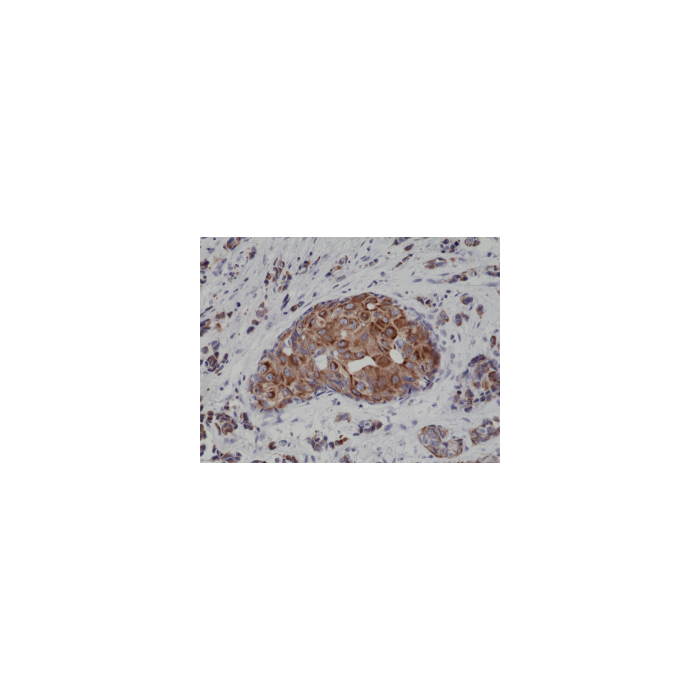Cookie Policy: This site uses cookies to improve your experience. You can find out more about our use of cookies in our Privacy Policy. By continuing to browse this site you agree to our use of cookies.
RevMab
anti-Cytokeratin-18 (human), Rabbit Monoclonal (RM279)

| Product Details | |
|---|---|
| Synonyms | CK18; CK-18; Cytokeratin 18 |
| Product Type | Recombinant Antibody |
| Properties | |
| Clone | RM279 |
| Isotype | Rabbit IgG |
| Source/Host | Rabbit |
| Immunogen/Antigen | A peptide corresponding to the N-terminus of human Cytokeratin-18. |
| Application |
Immunohistochemistry (IHC): 1:1000-1:4000 dilution |
| Crossreactivity | Human |
| Specificity |
This antibody reacts to human CK18 (Cytokeratin-18). |
| Purity | Protein A purified. |
| Purity Detail | Protein A affinity purified from an animal origin-free culture supernatant. |
| Concentration | N/A |
| Formulation | Liquid. 50% Glycerol/PBS with 1% BSA and 0.09% sodium azide. |
| Isotype Negative Control | |
| Other Product Data |
Click here for Original Manufacturer Product Datasheet |
| Accession Number | P05783 |
| Declaration | Manufactured by RevMab Biosciences. |
| Shipping and Handling | |
| Shipping | BLUE ICE |
| Long Term Storage | -20°C |
| Handling Advice | Avoid freeze/thaw cycles. |
| Use/Stability | Stable for at least 1 year after receipt when stored at -20°C. |
| Documents | |
| Product Specification Sheet | |
| Datasheet |
 Download PDF Download PDF |
Cytokeratins are keratin proteins found in the intracytoplasmic cytoskeleton of epithelial tissue (at least 20 different polypeptides). They are an important component of intermediate filaments, which help cells resist mechanical stress. Expression of these cytokeratins within epithelial cells is largely specific to particular organs or tissues. The subsets of cytokeratins which an epithelial cell expresses depends mainly on the type of epithelium, the moment in the course of terminal differentiation and the stage of development. Thus a specific cytokeratin expression profile allows the identification of epithelial cells. Furthermore, this applies also to the malignant counterparts of the epithelia, (carcinomas). Cytokeratin subtype expression patterns are used to an increasing extent in the distinction of different types of epithelial malignancies. The cytokeratin antibodies are not only of assistance in the differential diagnosis of tumors using immunohistochemistry on tissue sections, but are also a useful tool in cytopathology and flow cytometric assays. Cytokeratin-18 (Keratin 18; CK18) belongs to the type A (acidic) subfamily of low molecular weight keratins and exists in combination with cytokeratin-8. Tissues from gastrointestinal tract, respiratory tract and urogenital tract, as well as endocrine and exocrine tissues and mesothelial cells are positive for cytokeratin-18. Further, cytokeratin-18 is found primarily in non-squamous epithelia and is present in a majority of adenocarcinomas and ductal carcinomas, but not in squamous cell carcinomas. Mutations in the cytokeratin-18 gene have been linked to cryptogenic cirrhosis. During apoptosis, keratin filaments are altered and remarkably stable keratin fragments are generated. Activation of caspases leads to proteolysis of numerous cellular proteins, including structural components of epithelial cells. Cytokeratin-18 along with cytokeratin-8 are the major components of intermediate filaments in simple epithelial cells, and the only keratin pair in normal hepatocytes. Cytokeratin-18 is often used to identify differentiated isolated hepatocytes. During apoptosis, cytokeratin-8/cytokeratin-18 fragments are dramatically reorganized and cytokeratin-18 is cleaved by caspases at multiple sequence sites. Cleavage of cytokeratin-18 is an early event occurring during apoptosis.





